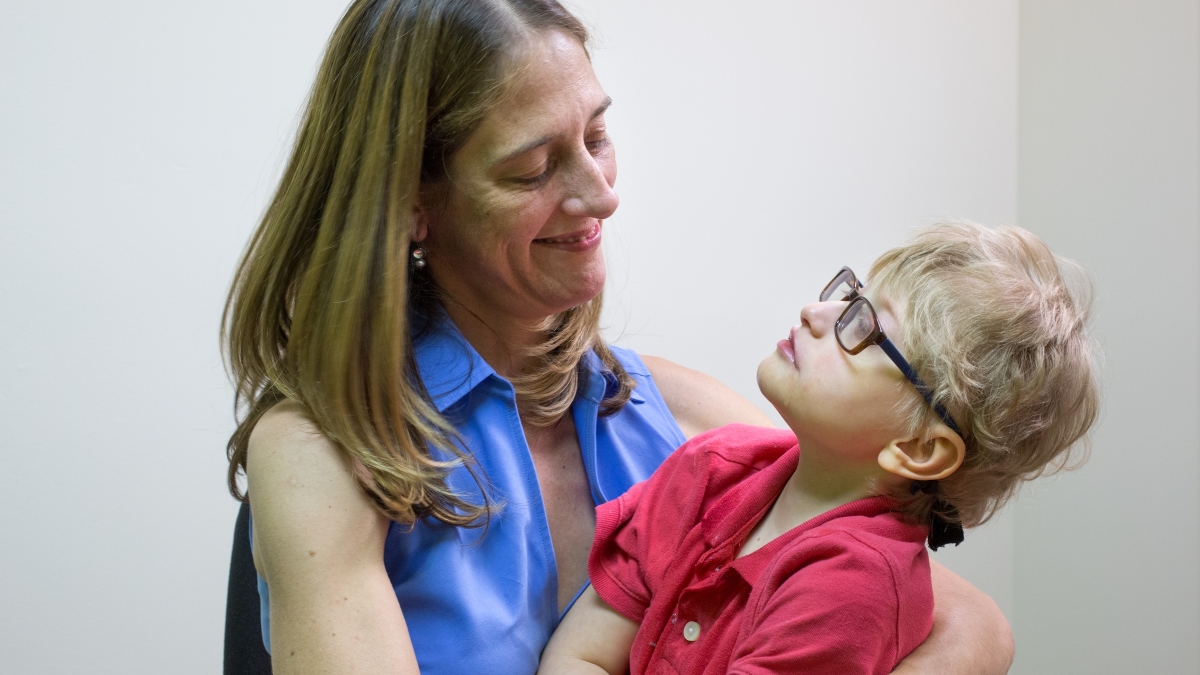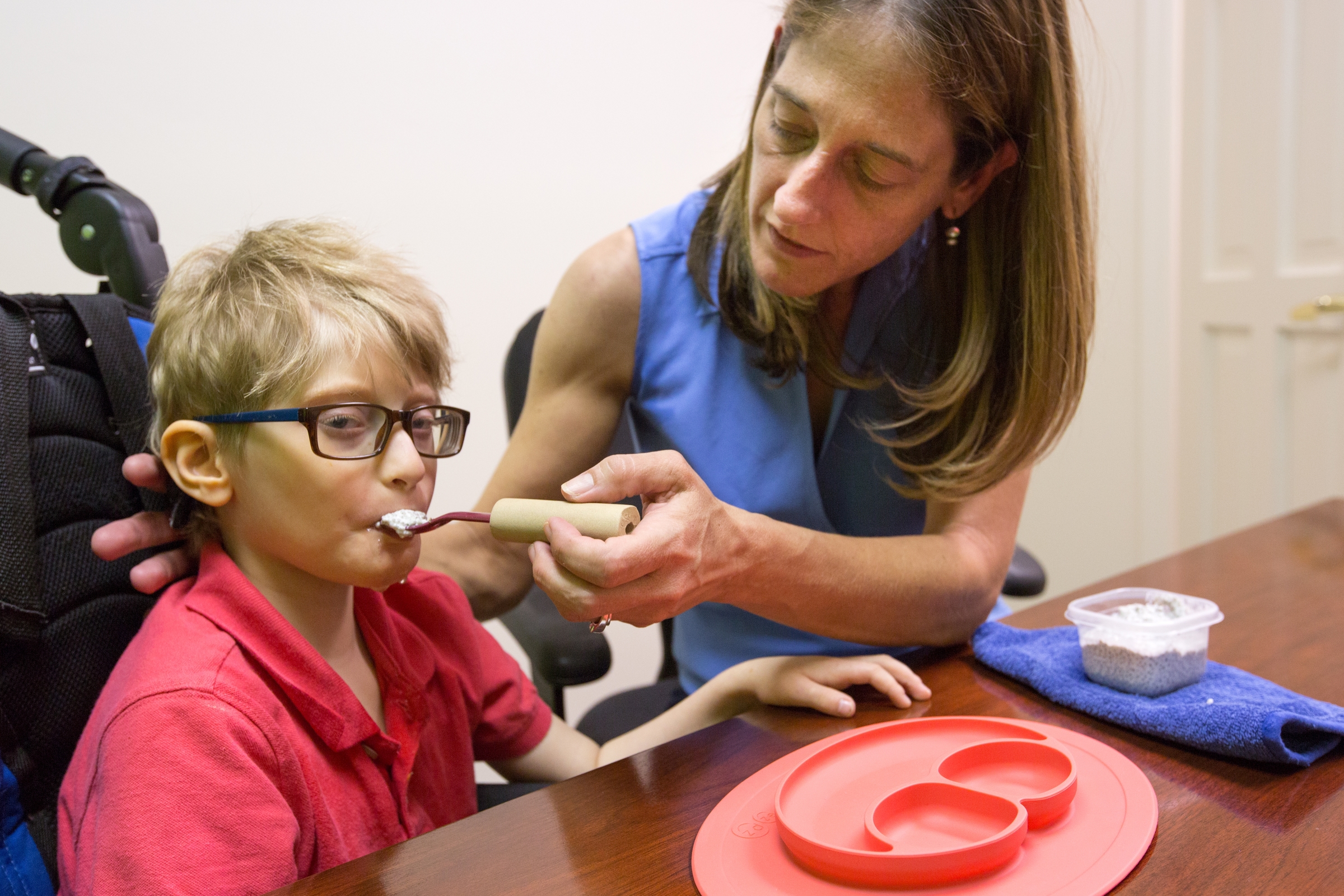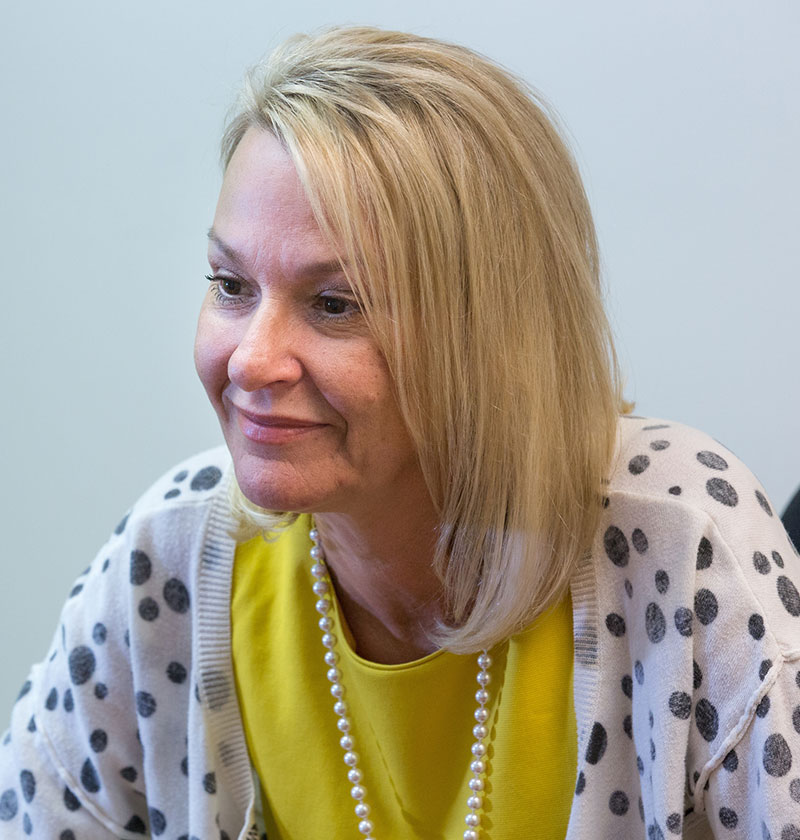Heidi Van der Molen doesn’t look back at her son Haydn’s early years with much sentimentality.
Besides the restless nights, countless visits to the doctor’s office and desperately trying to find an official diagnosis for his condition, there was a much more serious matter at hand: getting Haydn to eat.
“It was exhausting and emotionally draining because I’d spend every two hours pumping breast milk and every three hours trying to get him to drink,” said Van der Molen (pictured above with Hadyn). “… It makes you feel like a horrible mother because you can’t feed your child.”
Six and a half years later, Haydn, who has been diagnosed with 18q deletion syndrome18q deletion syndrome is a chromosomal condition that results when a piece of chromosome 18 is missing. The condition can lead to a wide variety of symptoms among affected individuals, including intellectual disability and delayed development., is still struggling to eat orally.
“He doesn't bring food to his mouth and needs support when drinking from a cup because he simply doesn’t have the skill level yet,” Van der Molen said. “There also aren’t a lot of trained individuals who can help us because what may work for one child may not work for another.”
The Van der Molens are not alone. It is estimated that more than 5 million school-age children in the United States have difficulty swallowing food, and over 1 million children ages birth to 5.
It’s a disorder that Van der Molen would like to see the medical community take more seriously. Today she is program director for Feeding Matters, a Scottsdale-based nonprofit whose mission is to bring pediatric feeding disorders to the forefront.
Feeding Matters helped spark a new certificate program offered by Arizona State University aimed at health-care professionals, students and parents to increase awareness of pediatric feeding disorders. The online program will be designed as a clearinghouse of information, drawing together a diversity of experts and parents.
Heidi Van der Molen tries to give her 6-year-old son Hadyn some vanilla chia pudding made with coconut milk at the headquarters of Feeding Matters in Scottsdale on May 26. Van de Molen is the group’s program manager. Hadyn was born with a rare chromosomal disorder, which affects his ability to swallow. Photos by Charlie Leight/ASU Now
“Despite the prevalence of pediatric feeding disorders and the impact it has on nutrition and development, not a single interdisciplinary online education program exists anywhere within the United States or internationally to combat them,” said Denise Stats-Caldwell, a clinical associate professor and speech-language pathologist in ASU’s Department of Speech and Hearing Science in the College of Health Solutions.
“Our goal is to get the word out to parents that if their child is struggling to eat and they’re being told they’ll grow out of it, there are resources available to them.”
And thanks to a recent $60,000 grant from Women and Philanthropy, a philanthropic program of the ASU Foundation, Stats-Caldwell will see that goal come to fruition in the fall of 2017.
Following the collection of expert materials, ASU and Feeding Matters will join forces to develop three online certificate courses for allied health professionals in collaboration with local and national experts, and the parents of children experiencing feeding difficulties.
The program got started last year when ASU sent a questionnaire to approximately 250 people, including physicians, nurses, occupational therapists, speech-language pathologists, physical therapists, psychologists, educators, caregivers, behavior analysts, lactation consultants and early-service coordinators.
Almost all of the respondents indicated a current need for continuing education in the area of pediatric feeding disorders.
“It’s an opportunity to provide education to medical professionals, who in my opinion are desperate and hungry for knowledge in this area,” said Chris Linn, director of Feeding Matters. “If they’ve become an expert in feeding at all, it’s because they’ve gone out and have educated themselves.”
Van der Molen said a large part of the problem is that there is no standard care for identifying, evaluating and managing pediatric feeding disorders because doctors are so busy.
“If you think about how busy pediatricians are, they only have a certain amount of time each day with patients,” Van Der Molen said. “They have standards and protocols to follow, and there’s not a whole lot they can do. Much of what they learn about pediatric feeding disorders is learned on the job.”
Stats-Caldwell said medical practitioners often lack the resources necessary for early intervention and case management on pediatric feeding disorders, and it’s difficult for professionals to collaborate with each other.
“We’ll be developing a curriculum that addresses the long-term goal of providing comprehensive education for ASU students, practicing professionals and parents of the children experiencing feeding difficulties,” Stats-Caldwell said. “The idea will be that anyone can take these classes, from the general public to the advanced practitioner.”
The first-of-its-kind certificate program will include live and recorded lectures, case studies, and videos of service provision across discipline type with experts from the fields of medicine, nursing, speech-language pathology, nutrition and psychology.
After the certificate program makes its debut next fall, Stats-Caldwell said the department will develop additional educational modules at the graduate and undergraduate level as well as parent training supported by fees for the courses.
Linn said a certificate program may sound like humble beginnings, but it’s the start of something big for pediatric feeding disorders.
“People have said to us, ‘You do realize you have 10 to 30 years of hard work ahead of you, right?’ and we do,” Linn said. “But somebody’s gotta do it, and we have to start somewhere. It’s an uphill battle, but we’re doing it and we couldn’t have a better or more courageous partner in ASU.
“We have a saying here, ‘We chisel at the mountain.’ I think it’ll come to huge fruition.”
More Health and medicine

New study seeks to combat national kidney shortage, improve availability for organ transplants
Chronic kidney disease affects one in seven adults in the United States. For two in 1,000 Americans, this disease will advance to kidney failure.End-stage renal failure has two primary…

New initiative aims to make nursing degrees more accessible
Isabella Koklys is graduating in December, so she won’t be one of the students using the Edson College of Nursing and Health Innovation's mobile simulation unit that was launched Wednesday at Arizona…

Reducing waste in medical settings
Health care saves lives, but at what cost? Current health care practices might be creating a large carbon footprint, according to ASU Online student Dr. Michele Domico, who says a healthier…




